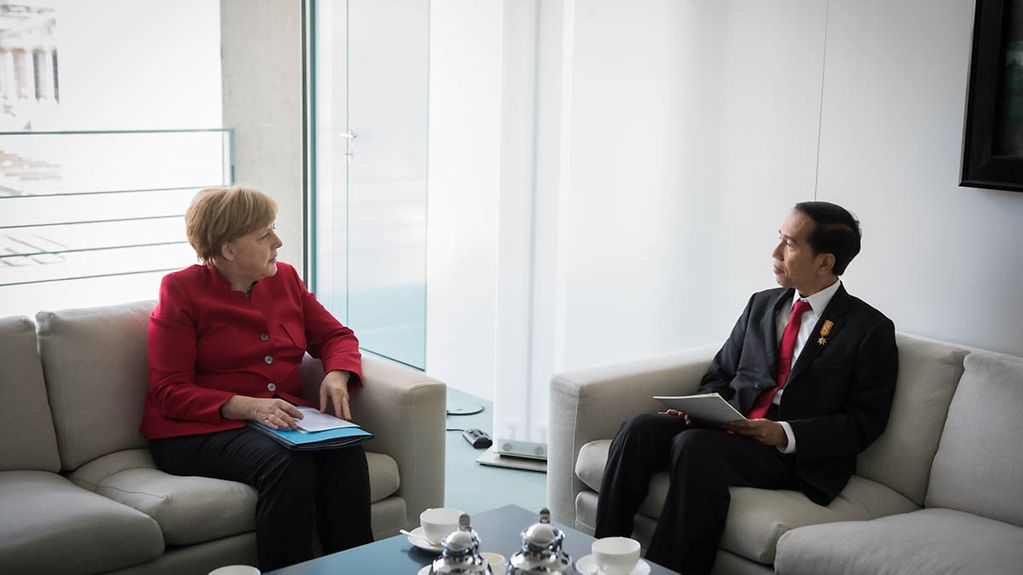Indonesian President in Berlin
Germany and Indonesia intend to expand cooperation, particularly in the economic sector, stressed the Chancellor following talks with Indonesia’s President Joko Widodo. She also underlined the fact that the fight against Islamist terrorism is a "joint fight".
3 min reading time

The Chancellor and Indonesia's President Joko Widodo discussed bilateral and business matters
Photo: Bundesregierung/Kugler
Chancellor Angela Merkel gave her visitor from the Southeast Asian archipelagic state a warm welcome. She recounted that she had met President Joko Widodo for the first time in November 2014 during the G20 summit in Brisbane. This is the President’s fist visit to Germany since he took office.
Intensifying vocational education and training
The two countries intend to take stock and ascertain where Germany and Indonesia stand today, almost four years after the Jakarta Declaration, reported the Chancellor. The Indonesian President would like to develop the strategic partnership agreed in 2012, particularly in the field of vocational education and training.
The Chancellor added that Uwe Beckmeyer, Parliamentary State Secretary at the Federal Ministry for Economic Affairs, will take first steps to explore "how we can strengthen the vocational education and training system in Indonesia and better anchor the system of dual vocational training there" during his trip to Indonesia in May. The spotlight will be on generating more interest on the part of private businesses.
When the Chancellor visited Indonesia in 2012, the "Jakarta Declaration" was signed. It is a wide-ranging agreement on a comprehensive partnership between Germany and Indonesia, and paves the way for closer cooperation between the two nations in a wide variety of areas in the years to come.
Strengthening free trade – sustainability is the goal
Indonesia is also very much interested in concluding a free trade agreement with the European Union. "If Europe intends to step up trade, we will need a free trade agreement of this sort." Germany will be doing what it can to ensure that the preparatory talks lead to negotiations as soon as possible, underlined the Chancellor.
When he took office in 2014 President Joko Widodo presented an extensive reform agenda, and has already "made a good start in many areas". Angela Merkel pointed to the scaling back of fuel subsidies and other regulations, as well as infrastructure packages.
She reported that they had also discussed the threat posed by further clearance of tropical forests. "I encouraged the President to take the very difficult path towards sustainable agriculture, and sustainable oil palm cultivation, thus protecting natural resources and the environment," said the Chancellor.
The joint fight against Islamist terrorism
"We acknowledge and appreciate the efforts made to comply with the legal system, and above all we appreciate the efforts made to ensure that different religious groups can live together in peace," said Angela Merkel. Indonesia is the world’s largest Muslim country and has mechanisms to peacefully resolve conflicts "deeply rooted in its system".
In view of the terrorist challenges in Europe, they looked together at how a mix of harsh measures and measures to promote cultural coexistence can help overcome conflicts, she reported. Young people from both states have travelled to Syria to be trained by the so-called Islamic State as jihadists. The fight against IS is thus a joint fight for Indonesia and Germany, declared the Chancellor.
It is "a mammoth task" to bring prosperity to a nation with 250 million inhabitants, spread over 17,000 islands, said the Chancellor, and expressed her great respect for what has already been achieved. "And we will be cooperating very closely on the questions that are still to be addressed," promised Angela Merkel with a view to legal certainty, legal systems and human rights.
Top-level political contacts between Germany and Indonesia have been stepped up significantly in recent years. At the end of 2011 Federal President Christian Wulff made a state visit to Indonesia. Chancellor Angela Merkel visited Jakarta in July 2012. President Joko Widodo’s predecessor, Susilo Bambang Yudhoyono, made a state visit to Berlin in March 2013.